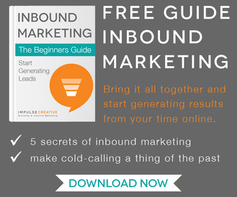 The concept of content marketing is constantly evolving. Just like with many aspects of inbound marketing and SEO, there are people out there holding on to misconceptions and even passing them along to others. Perhaps it is something that used to be true that that the industry has moved away from, or it may be something that is simply incorrect. With that in mind, here is Impulse Creative’s list of misconceptions you should not fall for, even if said by an “expert”:
The concept of content marketing is constantly evolving. Just like with many aspects of inbound marketing and SEO, there are people out there holding on to misconceptions and even passing them along to others. Perhaps it is something that used to be true that that the industry has moved away from, or it may be something that is simply incorrect. With that in mind, here is Impulse Creative’s list of misconceptions you should not fall for, even if said by an “expert”:
Misconception #1: Content Marketing is Only Digital
Content marketing is actually not a new phenomenon; it’s spans much further back than the rise of the internet and SEO. This infographic is a great reference to prove its historical relevance. Michelin was developing how-to guides over 100 years ago! Industry-related magazines, lectures, and PR-related newspaper articles are just a few examples of content marketing that existed long before the world wide web.
Misconception #2: Content Marketing is Just Creating Content
That being said, there is much more to content marketing than just producing pieces of content. A true content marketing strategy has to include concepts for content distribution, communication and engagement with the targeted audience, or Buyer Personas. You need to have a clear idea about what you are trying to achieve and who you are talking to with each piece of content. Each piece of content should fit into a strategy on the buyer’s journey
Misconception #3: All Content is Good Content
Because a piece of content must have a strategy and goal in mind when it is developed to be considered content marketing, it also means that not all content is good content. Don’t churn out seven blogs a week if only three of them are worth writing. Being constantly present is a huge part of it, but content marketing is not necessarily a numbers game. In our world of people being constantly bombarded with emails and social media posts, you can gain more with one outstanding piece of content in the right outlets to the right people than hundreds of cheap pieces of content no one really needs or wants to see. The biggest risk of creating too much content is that it can easily backfire and mark you as a spammer.
Misconception #4: SEO-Friendly Content is All That Matters
Producing content for search engine optimization purposes only is not only NOT content marketing, but it’s NOT proper SEO either. Google rewards those who create content with the reader’s experience in mind, not those who manipulate and use special words to try to sway the crawlbots. The content that is a part of content marketing is created for an  audience, an audience that wants a well-written, informative and entertaining piece of content. Keyword stuffing and over optimization will kill the user experience. You may fool Google enough to get people to your content for now, but you won’t successfully convert strangers to customers with this content.
audience, an audience that wants a well-written, informative and entertaining piece of content. Keyword stuffing and over optimization will kill the user experience. You may fool Google enough to get people to your content for now, but you won’t successfully convert strangers to customers with this content.
Misconception #5: Your Industry is Too Boring/Small/Etc for Content Marketing
If you are able to stay in business, that means you have a service that people want and/or need. That also means those people are searching for you, whether they know it or not. Even a very niche business still has the opportunity to pull people in at the top of the funnel. Just because your business sells windows, doesn’t mean your content has to be 100 percent window focused. Afterall, people may not know they need a new window yet! The opportunity to create high-quality content is there, regardless of what industry you serve.
Content marketing’s purpose is to attract new customers and retain current customers by consistently creating relevant and remarkable content. It is an ongoing process, not a quick fix. It works best when integrated with a complete inbound marketing strategy. For more information of content marketing and the inbound methodology in general download our free Ebook The Beginner's Guide to Inbound Marketing.





